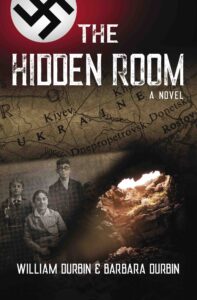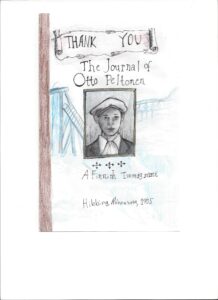After returning home from a week of school appearances in Houghton, Painesdale, and Baraga, Michigan, (and spending an enjoyable evening at the Portage Library) I received a a package of thank-you notes from the students in the Jeffers Middle School. My favorite was from Lana, who used the cover of my novel, The Journal of Otto Peltonen, to inspire her art work!
Blog
-
A Creative Thank-you Note
October 28, 2022
Category: Book signing, Education, Public Library visits, School appearancesTags: school appearances |
-
The Hidden Room review from St. Paul Pioneer Press
August 1, 2022

The Hidden Room by William Durbin and Barbara Durbin (Lake Vermillion Press, $11.99)
Reviewed by MaryAnn Grossman, St. Paul Pioneer Press 6/18/22
“‘Run!’ I shout, stunned that we’ve been caught in the middle of a German and Russian tank battle. We bolt across the bridge, veering toward the woods just as a tank behind us returns fire.”
This riveting story of a Jewish family who lived in a cave in Ukraine during the last year of World War II is written for middle grade readers but it should be read by everyone who watches the horrors unfolding in that country now.
Written by the Durbin husband/wife team, it’s based on the true story of Esther Stermer and her family, who took refuge in a cave, as did many others, when the Nazis invaded their village in Ukraine.
Less talented authors could have made this story almost too difficult to read, since it brings up the Holodomor, when Josef Stalin starved millions of Ukrainians (and others) in the early 1930s. The Nazis of course are no better than the Soviets, shooting Jews into their graves. And some Ukrainians were eager to reveal Jewish neighbors’ hiding places.
Yet the fictional family in the book finds ways to laugh as they try to grow used to the darkness of their cave. Jacob, who’s 14, tries to look after his 4-year-old brother, Eli, and 9-year-old sister, Rachel, when he’s not cutting wood with his dad under cover of darkness. They have supplies, thanks to Stepan, son of their kind next door neighbor who is risking her life to help them.
Much of the book is about how people stay alive and sane living in darkness (they do have lamps) always worrying about when the food will run out. When they take in Elena, a Ukrainian girl, the food supply gets tighter, but they consider her a daughter even though she’s a Christian. Elena and Jacob are the only ones capable of sneaking out under cover of darkness to forage for nuts and other foods the mother can use for making stew. But as winter lingers, there isn’t anything to forage for in the surrounding forest and the family is close to starvation.
Besides interesting historical information about Ukraine, this fast-paced novel is also exciting when Jacob and Elena evade enemy tanks, with humor provided by Eli’s obsession with thoughts of jelly doughnuts. And there’s bravery, including the mother’s insistence that things are going to be OK and how she somehow finds ways to celebrate Jewish holidays and the kids’ birthdays, even though there isn’t much to eat.
Bill Durbin, winner of two Minnesota Book Awards, has written 14 novels. He and his wife, a former teacher, divide their time between Lake Vermillion on the edge of the Boundary Waters Canoe Area and Duluth, MN.
Category: book reviews, bookstores, Education, Historical Fiction, Holocaust, Jewish history, Jewish life, World War IITags: The Hidden Room |
-
New WWII Novel Set in Ukraine
April 20, 2022
Out May 10th
Could you survive in a cave…for a whole year?
That’s the challenge facing fourteen-year-old Jacob. Set in Ukraine during the final months of World War II, THE HIDDEN ROOM is based on the true story of a Jewish family who escapes the Nazi terror by taking refuge in a remote cave. Jacob adjusts to the hardships of living underground and the dangers of night-time adventures outside. Food is scarce. Darkness, bone-chilling cold, and the fear of being captured are constant. But a surprising discovery gives his family reason to hope.
THE HIDDEN ROOM reveals little-known but vivid historical details of Ukraine, including Stalin’s brutal pre-war campaign of forced starvation, known as the Holodomor. You will celebrate the courage of a family who stays positive, even in the face of adversity that threatens their survival.
Category: Education, Historical Fiction
-
Fact Checking, Fake News, and Disinformation (Lies)
March 28, 2021
During my author visits to schools, in addition to the usual questions I get about my historical novels and my research methods, students and teachers often ask me for tips on how to decide which sources of news information they can trust.
A major challenge today is that anyone can post anything online, no matter how untruthful or ridiculous it might be. In fact, contrary to what we might assume, the more outrageous and unbelievable a claim is, the more likely it is to spread rapidly on the internet. And the more engaged and angry people get on Facebook, Twitter, and other social media sites, the more money those companies make.
One good way to verify information is to seek out one of the handful of organizations that provide unbiased fact checking. And unlike media companies and so-called social media “influencers” who profit from internet activity, the organizations listed below are supported by contributions, and they have no motivation to be anything but truthful.
FactCheck.org Annenberg Political Factcheck – a project of the Annenberg Public Policy Center. Monitors the accuracy of statements made by major U.S. political players.
FactChecker (Washington Post) Weekly blog from the Washington Post.
PolitiFact.com Produced by the St. Petersburg Times and Congressional Quarterly. Includes a “Truth-O-Meter” scorecard that checks attacks on political candidates.
Snopes.com Oldest and most comprehensive fact-checking site on the Internet.
PunditFact Dedicated to verifying the accuracy of claims by pundits, columnists, bloggers, political analysts, the hosts and guests of talk shows, and other members of the media.”
It’s important to keep in mind that whenever Americans get angry at each other, the enemies of democracy are the ones who benefit. Political discord and polarization within our country gives an advantage to our international rivals such as Russia and China. The cold-war era days of espionage and spies have, for the most part, been replaced with online disinformation professionals. Agents employed by foreign powers are paid to sit at computer terminals and pose as Americans by creating fake online identities. Their goal is to spread lies and to make outrageous claims, which lead Americans to distrust each other, and ultimately, to question the legitimacy of our government.
Democracy can’t function without informed citizens, for In the words of Thomas Jefferson, “An educated citizenry is a vital requisite for our survival as a free people.”
Category: Education, Writing TipsTags: democracy, education, school visits |


